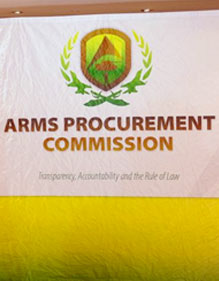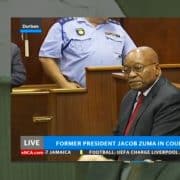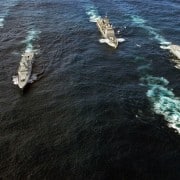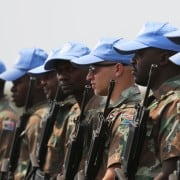|
Getting your Trinity Audio player ready...
|
 By Lee-Ann Alfreds
By Lee-Ann Alfreds
He came, he spoke, he left. That was the sum of Fana Hlongwane’s eagerly-awaited appearance at the Arms Procurement Commission.
In one of the shortest appearances on the stand, the middleman accused of pocketing hundreds of millions from the arms deal:
* first tried to have the media banned from taking photographs and video recordings while he testified;
* then questioned why he had been called as “times had changed and a black man from Soweto could also be progressive”;
* before denying paying anyone involved in the arms deal to influence the awarding of contract.
A one-time advisor to former defence minister Joe Modise, Hlongwane is accused by arms critics of being a key intermediary who – on behalf of arms deal company BAE – pushed for South Africa to buy Hawk trainer jets and Gripen fighter aircraft from BAE-Saab, which formed the bulk of the package. The City Press revealed BAE had forked out over R200-milion in commission to Hlongwane for assisting them in winning arms deal contracts and managing their offset projects in South Africa.
The Arms Procurement Commission is investigating allegations of fraud and corruption in the arms deal which is estimated to have cost South Africa more than R70-billion.
Eventful appearance
Despite its brevity, the appearance of Hlongwane – whose testimony was postponed last month after his legal team indicated they were not ready to proceed – was eventful.
First, his advocate Jaap Celliers applied to bar the media from showing his picture because, according to his lawyer, this would infringe on his client's safety, privacy and the security of his family, and negatively affect his business, Sapa reported. "Up until now, there has never been any publication of him in the press and he's able to move around freely," said Celliers, highlighting the fact that his client was a "very private" person.
"If published, everyone in South Africa will recognise him and this will affect his family," he said, adding that there were previous threats made against Hlongwane.
Celliers requested commission chairman Willie Seriti order that no pictures be taken of Hlongwane during the proceedings and even in the foyer during adjournments.
Seriti had indicated that he had no authority outside the chambers before Hlongwane abandoned his application.
Taking the stand, Hlongwane then questioned why he had been called to testify, Sapa reported. “Why am I here?” he asked the commission.
He said he did not understand why there was an issue over the payments made to him when he was Modise’s consultant because it was up to two entities to decide on payment. “You cannot criminalise a businessman simply because of quantum,” he said.
Lashing out at critics who had claimed he was involved in corrupt activities which resulted in the massive payouts, Hlongwane said they did this because they failed to understand that times had changed and a black man from Soweto could also be progressive.
“I do not support an inferiority mindset,” said Hlongwane.
He claimed that when white people funds pocketed funds, these were regarded as bonuses which were above board.
More denials
Hlongwane said none of the witnesses who had testified had provided any evidence supporting claims of corruption in the deal.
He said former president Thabo Mbeki and various cabinet ministers who had testified had provided clear and unequivocal evidence.
“They rejected any suggestion of improper influence relating to the award or conclusion of any of the SDPP [strategic defence procurement package] contracts,” said Hlongwane. “Apart from the fact that their evidence was clear on this issue, their evidence was never disputed.”
Hlongwane denied allegations that he or his company had had any influence on the arms deal.
“I can further categorically state that I did not pay any gratification to anybody who was involved in the procurement process in order to influence such person relating to the award or conclusion of any of the contracts awarded and concluded in the SDPP,” he said.
Hlongwane, the last witness to testify, had been scheduled to deliver his testimony and cross-examination over two days. But he concluded his testimony in less than one without any questions being posed from the panel and legal representatives.
The term of the commission has been extended to April 30 next year.








